- Home
- Sidney Sheldon
Master of the Game motg-1 Page 5
Master of the Game motg-1 Read online
Page 5
When Jamie McGregor walked into the Sundowner Saloon, it was almost deserted, for most of the prospectors were on then-way to Paardspan. Jamie was filled with anger and despair. It's incredible, he thought. One minute I'm as rich as Croesus, and the next minute I'm dead broke. Van der Merwe is a thief, and I'm going to find a way to punish him. But how? Van der Merwe was right. Jamie could not even afford a lawyer to fight his case. He was a stranger there, and Van der Merwe was a respected member of the community. The only weapon Jamie had was the truth. He would let everyone in South Africa know what Van der Merwe had done.
Smit, the bartender, greeted him. "Welcome back. Everything's on the house, Mr. McGregor. What would you like?"
"A whiskey."
Smit poured a double and set it in front of Jamie. Jamie downed it in one gulp. He was not used to drinking, and the hard liquor scorched his throat and stomach.
"Another, please."
"Comin' up. I've always said the Scots could drink anybody under the table."
The second drink went down easier. Jamie remembered that it was the bartender who had told a digger to go to Van der Merwe for help. "Did you know Old Man Van der Merwe is a crook? He's trying to cheat me out of my diamonds."
Smit was sympathetic. "What? That's terrible. I'm sorry to hear that."
"He'll nae get away with it." Jamie's voice was slurred. "Half those diamonds are mine. He's a thief, and I'm gonna see that everybody knows it."
"Careful. Van der Merwe's an important man in this town," the bartender warned. "If you're goin' up against him, you'll need help. In fact, I know just the person. He hates Van der Merwe as much as you do." He looked around to make sure no one could overhear him. "There's an old bam at the end of the street. I'll arrange everything. Be there at ten o'clock tonight."
"Thanks," Jamie said gratefully. "I won't forget you."
"Ten o'clock. The old barn."
The barn was a hastily thrown-together structure built of corrugated tin, off the main street at the edge of town. At ten o'clock Jamie arrived there. It was dark, and he felt his way carefully. He could see no one around. He stepped inside. "Hello ..."
There was no reply. Jamie went slowly forward. He could make out the dim shapes of horses moving restlessly in their stalls. Then he heard a sound behind him, and as he started to turn, an iron bar crashed across his shoulder blades, knocking him to the ground. A club thudded against his head, and a giant hand picked him up and held him while fists and boots smashed into his body. The beating seemed to last forever. When the pain became too much to bear and he lost consciousness, cold water was thrown in his face. His eyes fluttered open. He thought he caught a glimpse of Van der Merwe's servant, Banda, and the beating began anew. Jamie could feel his ribs breaking. Something smashed into his leg, and he heard the crunch of bone.
That was when he lost consciousness again.
His body was on fire. Someone was scraping his face with sandpaper, and he vainly tried to lift a hand to protest. He made an effort to open his eyes, but they were swollen shut. Jamie lay there, every fiber of his being screaming with pain, as he tried to remember where he was. He shifted, and the scraping began again. He put out his hand blindly and felt sand. His raw face was lying in hot sand. Slowly, every move an agony, he managed to draw himself up on his knees. He tried to see through his swollen eyes, but he could make out only hazy images. He was somewhere in the middle of the trackless Karroo, naked. It was early morning, but he could feel the sun starting to burn through his body. He felt around blindly for food or a billy can of water. There was nothing. They had left him there for dead. Salomon van der Merwe. And, of course, Smit, the bartender. Jamie had threatened Van der Merwe, and Van der Merwe had punished him as easily as one punished a small child. But he'll find out I'm no child, Jamie promised himself. Not anymore. I'm an avenger. They'll pay. They will pay. The hatred that coursed through Jamie gave him the strength to sit up. It was a torture for him to breathe. How many ribs had they broken? I must be careful so they don't puncture my lungs. Jamie tried to stand up, but fell down with a scream. His right leg was broken and lay at an unnatural angle. He was unable to walk. But he could crawl.
Jamie McGregor had no idea where he was. They would have taken him to some place off the beaten track, where his body would not be found except by the desert scavengers, the hyenas and secretary birds and vultures. The desert was a vast charnel house. He had seen the bones of men's bodies that had been scavenged, and there had not been a scrap of meat left on the skeleton. Even as Jamie was thinking about it, he heard the rustle of wings above him and the shrill hiss of the vultures. He felt a flood of terror. He was blind. He could not see them. But he could smell them.
He began to crawl.
He made himself concentrate on the pain. His body was aflame with it, and each small movement brought exquisite rivers of agony. If he moved in a certain way, his broken leg would send out stabbing pains. If he shifted his position slightly to favor his leg, he could feel his ribs grinding against each other. He could not stand the torture of lying still; he could not stand the agony of moving.
He kept crawling.
He could hear them circling above, waiting for him with an ancient, timeless patience. His mind started to wander. He was in the cool kirk at Aberdeen, neatly dressed in his Sunday suit, seated between his two brothers. His sister, Mary, and Annie Cord were wearing beautiful white summer dresses, and Annie Cord was looking at him and smiling. Jamie started to get up and go to her, and his brothers held him back and began to pinch him. The pinches became excruciating shafts of pain, and he was crawling through the desert again, naked, his body broken. The cries of the vultures were louder now, impatient.
Jamie tried to force his eyes open, to see how close they were. He could see nothing except vague, shimmering objects that his terrified imagination turned into feral hyenas and jackals. The wind became their hot, fetid breath caressing his face.
He kept crawling, for he knew that the moment he stopped they would be upon him. He was burning with fever and pain and his body was flayed by the hot sand. And still, he could not give up, not as long as Van der Merwe was unpunished—not as long as Van der Merwe was alive.
He lost all awareness of time. He guessed that he had traveled a mile. In truth, he had moved less than ten yards, crawling in a circle. He could not see where he had been or where he was going. He focused his mind on only one thing: Salomon van der Merwe.
He slipped into unconsciousness and was awakened by a shrieking agony beyond bearing. Someone was stabbing at his leg, and it took Jamie a second to remember where he was and what was happening. He pulled one swollen eye open. An enormous hooded black vulture was attacking his leg, savagely tearing at his flesh, eating him alive with its sharp beak. Jamie saw its beady eyes and the dirty ruff around its neck. He smelled the foul odor of the bird as it sat on his body. Jamie tried to scream, but no sound came out. Frantically he jerked himself forward, and felt the warm flow of blood pouring from his leg. He could see the shadows of the giant birds all around him, moving in for the kill. He knew that the next time he lost consciousness would be the last time. The instant he stopped, the carrion birds would be at his flesh again. He kept crawling. His mind began to wander into delirium. He heard the loud flapping wings of the birds as they moved closer, forming a circle around him. He was too weak now to fight them off; he had no strength left to resist. He stopped moving and lay still on the burning sand. The giant birds closed in for their feast.
Saturday was market day in Cape Town and the streets were crowded with shoppers looking for bargains, meeting friends and lovers. Boers and Frenchmen, soldiers in colorful uniforms and English ladies in flounced skirts and ruffled blouses mingled in front of the bazaars set up in the town squares at Braameon-stein and Park Town and Burgersdorp. Everything was for sale: furniture, horses and carriages and fresh fruit. One could purchase dresses and chessboards, or meat or books in a dozen different languages. On Saturdays, Cape Town was a n
oisy, bustling fair.
Banda walked along slowly through the crowd, careful not to make eye contact with the whites. It was too dangerous. The streets were filled with blacks, Indians and coloreds, but the white minority ruled. Banda hated them. This was his land, and the whites were the uitlanders. There were many tribes in southern Africa: the Basutos, Zulus, Bechuanas, the Matabele—all of them Bantu. The very word bantu came from abantu—the people. But the Barolongs—Banda's tribe—were the aristocracy. Banda remembered the tales his grandmother told him of the great black kingdom that had once ruled South Africa. Their kingdom, their country. And now they were enslaved by a handful of white jackals. The whites had pushed them into smaller and smaller territories, until their freedom had been eroded. Now, the only way a black could exist was by slim, subservient on the surface, but cunning and clever beneath.
Banda did not know how old he was, for natives had no birth certificates. Their ages were measured by tribal lore: wars and battles, and births and deaths of great chiefs, comets and blizzards and earthquakes, Adam Kok's trek, the death of Chaka and the cattle-killing revolution. But the number of bis years made no difference. Banda knew he was the son of a chief, and that he was destined to do something for his people. Once again, the Bantus would rise and rule because of him. The thought of his mission made him walk taller and straighter for a moment, until he felt the eyes of a white man upon him.
Banda hurried east toward the outskirts of town, the district allotted to the blacks. The large homes and attractive shops gradually gave way to tin shacks and lean-tos and huts. He moved down a dirt street, looking over bis shoulder to make certain he was not followed. He reached a wooden shack, took one last look around, rapped twice on the door and entered. A thin black woman was seated in a chair in a corner of the room sewing on a dress. Banda nodded to her and then continued on into the bedroom in back.
He looked down at the figure lying on the cot.
Six weeks earlier Jamie McGregor had regained consciousness and found himself on a cot in a strange house. Memory came flooding back. He was in the Karroo again, his body broken, helpless. The vultures ...
Then Banda had walked into the tiny bedroom, and Jamie knew he had come to kill him. Van der Merwe had somehow learned Jamie was still alive and had sent his servant to finish him off.
"Why didn't your master come himself?" Jamie croaked.
"I have no master."
"Van der Merwe. He didn't send you?"
"No. He would kill us both if he knew."
None of this made any sense. "Where am I? I want to know where I am."
"Cape Town."
"That's impossible. How did I get here?"
"I brought you."
Jamie stared into the black eyes for a long moment before he spoke. "Why?"
"I need you. I want vengeance."
"What do you—?"
Banda moved closer. "Not for me. I do not care about me. Van der Merwe raped my sister. She died giving birth to his baby. My sister was eleven years old."
Jamie lay back, stunned. "My God!"
"Since the day she died I have been looking for a white man to help me. I found him that night in the barn where I helped beat you up, Mr. McGregor. We dumped you in the Karroo. I was ordered to kill you. I told the others you were dead, and I returned to get you as soon as I could. I was almost too late."
Jamie could not repress a shudder. He could feel again the foul-smelling carrion bird digging into his flesh.
"The birds were already starting to feast. I carried you to the wagon and hid you at the house of my people. One of our doctors taped your ribs and set your leg and tended to your wounds."
"And after that?"
"A wagonful of my relatives was leaving for Cape Town. We took you with us. You were out of your head most of the time. Each time you fell asleep, I was afraid you were not going to wake up again."
Jamie looked into the eyes of the man who had almost murdered him. He had to think. He did not trust this man—and yet he had saved his life. Banda wanted to get at Van der Merwe through him. That can work both ways, Jamie decided. More than anything in the world, Jamie wanted to make Van der Merwe pay for what he had done to him.
"All right," Jamie told Banda. "I'll find a way to pay Van der lierwe back for both of us."
For the first time, a thin smile appeared on Banda's face. "Is he going to die?" > "No," Jamie told him. "He's going to live."
Jamie got out of bed that afternoon for the first time, dizzy and weak. His leg still had not completely healed, and he walked with a slight limp. Banda tried to assist him.
"Let go of me. I can make it on my own."
Banda watched as Jamie carefully moved across the room.
'I'd like a mirror," Jamie said. / must look terrible, he thought. How long has it been since I've had a shave? Banda returned with a hand mirror, and Jamie held it up to his face. He was looking at a total stranger. His hair had turned snow-white. He had a full, unkempt white beard. His nose had been broken and a ridge of bone pushed it to one side. His face had aged twenty years. There were deep ridges along his sunken cheeks and a livid scar across his chin. But the biggest change was in his eyes. They were eyes that had seen too much pain, felt too much, hated too much. He slowly put down the mirror.
"I'm going out for a walk," Jamie said.
"Sorry, Mr. McGregor. That's not possible."
"Why not?"
"White men do not come to this part of town, just as blacks never go into the white places. My neighbors do not know you are here. We brought you in at night."
"How do I leave?"
"I will move you out tonight."
For the first time, Jamie began to realize how much Banda had risked for him. Embarrassed, Jamie said, "I have no money. I need a job."
"I took a job at the shipyard. They are always looking for men." He took some money from his pocket. "Here."
Jamie took the money. "I'll pay it back."
"You will pay my sister back," Banda told him.
It was midnight when Banda led Jamie out of the shack. Jamie looked around. He was in the middle of a shantytown, a jungle of rusty, corrugated iron shacks and lean-tos, made from rotting planks and torn sacking. The ground, muddy from a recent rain, gave off a rank odor. Jamie wondered how people as proud as Banda could bear spending their lives in a place such as this. "Isn't there some—?"
"Don't talk, please," Banda whispered. "My neighbors are inquisitive." He led Jamie outside the compound and pointed "The center of town is in that direction. I will see you at the shipyard."
Jamie checked into the same boardinghouse where he had stayed on his arrival from England. Mrs. Venster was behind the desk.
"I'd like a room," Jamie said.
"Certainly, sir." She smiled, revealing her gold tooth. "I'm Mrs. Venster."
"I know."
"Now how would you know a thing like that?" she asked coyly. "Have your men friends been tellin' tales out of school?"
"Mrs. Venster, don't you remember me? I stayed here last year."
She took a close look at his scarred face, his broken nose and his white beard, and there was not the slightest sign of recognition. "I never forget a face, dearie. And I've never seen yours before. But that don't mean we're not going to be good friends, does it? My friends call me 'Dee-Dee.' What's your name, love?"
And Jamie heard himself saying, "Travis. Ian Travis."
The following morning Jamie went to see about work at the shipyard.
The busy foreman said, "We need strong backs. The problem is you might be a bit old for this kind of work."
"I'm only nineteen—" Jamie started to say and stopped himself. He remembered that face in the mirror. 'Try me," he said.
He went to work as a stevedore at nine shillings a day, loading and unloading the ships that came into the harbor. He learned that Banda and the other black stevedores received six shillings a day. At the first opportunity, Jamie pulled Banda aside and said,
&n
bsp; "We have to talk."
"Not here, Mr. McGregor. There's an abandoned warehouse at the end of the docks. I'll meet you there when the shift is over."
Banda was waiting when Jamie arrived at the deserted warehouse.
"Tell me about Salomon van der Merwe," Jamie said.
"What do you want to know?"
"Everything."
Banda spat. "He came to South Africa from Holland. From stories I heard, his wife was ugly, but wealthy. She died of some sickness and Van der Merwe took her money and went up to Klipdrift and opened his general store. He got rich cheating diggers."
"The way he cheated me?"
'That's only one of his ways. Diggers who strike it lucky go to him for money to help them work their claim, and before they know it Van der Merwe owns them."
"Hasn't anyone ever tried to fight back?"
"How can they? The town clerk's on his payroll. The law says that if forty-five days go by without working a claim, it's open. The town clerk tips off Van der Merwe and he grabs it. There's another trick he uses. Claims have to be staked out at each boundary line with pegs pointing straight up in the air. If the pegs fall down, a jumper can claim the property. Well, when Van der Merwe sees a claim he likes, he sends someone around at night, and in the morning the stakes are on the ground." "Jesus!"
"He's made a deal with the bartender, Smit. Smit sends likely-looking prospectors to Van der Merwe, and they sign partnership contracts and if they find diamonds, Van der Merwe takes everything for himself. If they become troublesome, he's got a lot of men on his payroll who follow his orders." "I know about that," Jamie said grimly. "What else?"
"He's a religious fanatic. He's always praying for the souls of sinners."
"What about his daughter?" She had to be involved in this.
"Miss Margaret? She's frightened to death of her father. If she even looked at a man, Van der Merwe would kill them both."
Jamie turned his back and walked over to the door, where he stood looking out at the harbor. He had a lot to think about. "We'll talk again tomorrow."

 Windmills of the Gods
Windmills of the Gods After the Darkness
After the Darkness The Best Laid Plans
The Best Laid Plans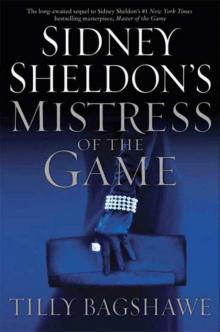 Mistress of the Game
Mistress of the Game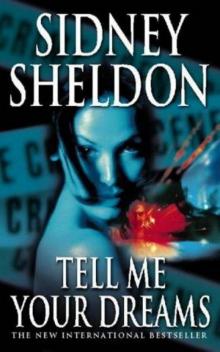 Tell Me Your Dreams
Tell Me Your Dreams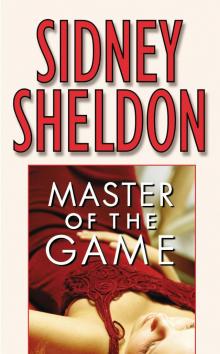 Master of the Game
Master of the Game Memories of Midnight
Memories of Midnight Are You Afraid of the Dark?
Are You Afraid of the Dark? Nothing Lasts Forever
Nothing Lasts Forever Rage of Angels
Rage of Angels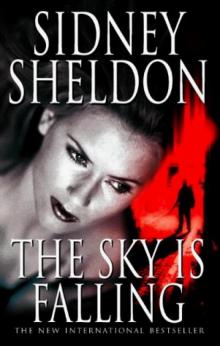 The Sky Is Falling
The Sky Is Falling The Sands of Time
The Sands of Time Morning, Noon and Night
Morning, Noon and Night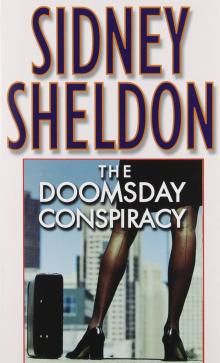 The Doomsday Conspiracy
The Doomsday Conspiracy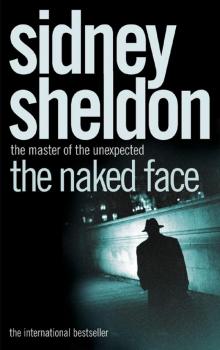 The Naked Face
The Naked Face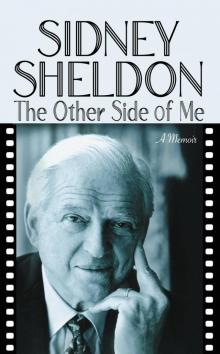 The Other Side of Me
The Other Side of Me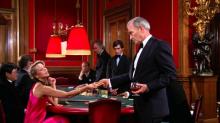 Bloodline
Bloodline The Stars Shine Down
The Stars Shine Down The Other Side of Midnight
The Other Side of Midnight A Stranger in the Mirror
A Stranger in the Mirror Sidney Sheldon's Angel of the Dark
Sidney Sheldon's Angel of the Dark Sidney Sheldon's the Tides of Memory
Sidney Sheldon's the Tides of Memory The Phoenix
The Phoenix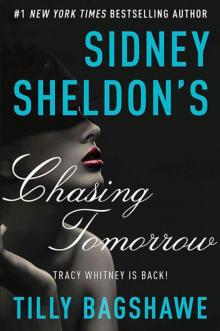 Sidney Sheldon's Chasing Tomorrow (Tracy Whitney)
Sidney Sheldon's Chasing Tomorrow (Tracy Whitney) Sidney Sheldon's After the Darkness
Sidney Sheldon's After the Darkness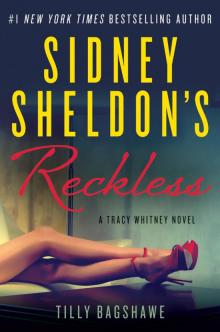 Sidney Sheldon's Reckless
Sidney Sheldon's Reckless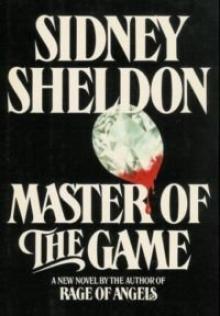 Master of the Game motg-1
Master of the Game motg-1 Sidney Sheldon's the Silent Widow
Sidney Sheldon's the Silent Widow Morning, Noon & Night
Morning, Noon & Night